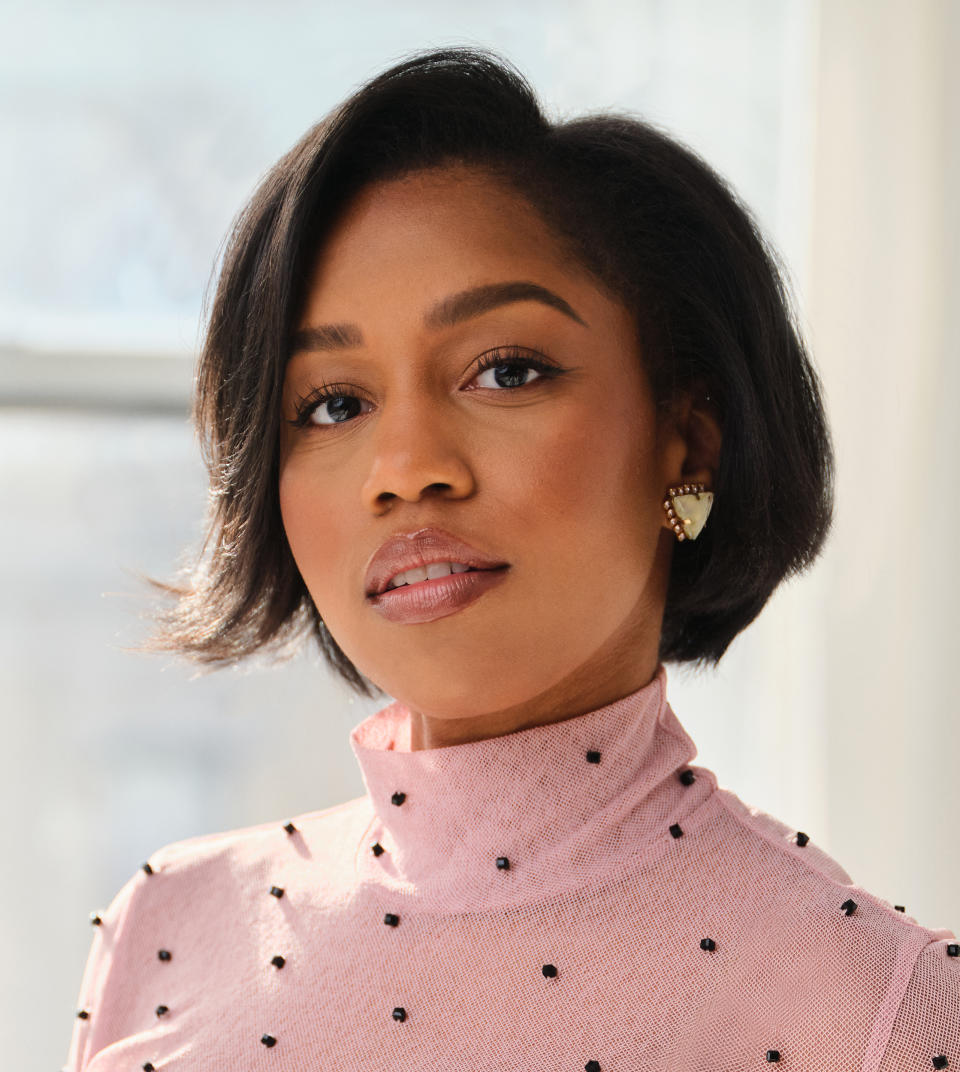Broadway's most popular role will finally be played by a Black actress
In Act one of the Broadway musical "Wicked," the character Glinda makes a dramatic entrance, floating onstage in a magic bubble. Wearing a sky-blue ball gown and a glittery tiara, she smiles and remarks: “It’s good to see me, isn’t it?”
For Brittney Johnson, the latest Good Witch on the Great White Way, it’s good to be seen. Back in 2019, the actress made history as the first woman of color to play Glinda in the hit production, going on as the understudy. Now, she’s poised to break barriers again, taking over full-time as the show’s first Black leading lady beginning Feb. 14.
“I’m really excited for people to be able to see someone who looks like them onstage, wearing the crown,” said Johnson, who has used her platform to address representation and equity issues on Broadway. “As soon as I put that crown on — and there’s something about wearing a crown — it’s very special. It’s fun.”

“Wicked” has been a blockbuster since its 2003 opening at the Gershwin Theatre. It’s based on the novel by Gregory Maguire, music and lyrics by Stephen Schwartz, and a book by Winnie Holzman. It draws inspiration from “The Wonderful Wizard of Oz,” the classic novel authored by L. Frank Baum more than a century ago.
The show doesn’t follow Baum’s main character, Dorothy, but instead focuses on the unlikely friendship between the fiery, misunderstood witch Elphaba and her bubbly, popular classmate Glinda. All is well, until the world decides to dub one as good, and the other as wicked.
"Wicked" is among Broadway’s longest-running shows, with upward of $5 billion in box-office sales. It’s been seen by domestic and global audiences, and translated into at least six languages. Along the way, there’ve been a slew of accolades, among them, several Tony awards and a Grammy.
Johnson, a millennial, brings her own talents and accomplished résumé to the acclaimed production. Growing up in Maryland, she initially “didn’t really know Broadway was a thing,” although her family recognized her budding talent early on.
“My mom says I was singing before I was talking,” she said. “I started taking private voice lessons at age 8.”
In high school, her classical vocal training came in handy when she performed in musical theater, although she quips, “I wanted to be the next Mariah Carey.”
After heading to the Big Apple for college, Johnson graduated with a bachelor of fine arts from New York University’s Tisch School of the Arts in 2012.
“I remember during the pre-college program at NYU, I saw about 30 Broadway shows,” she said. Seeing the ornate sets, costumes and thespians was life-changing, and foreshadowed her future. “It makes you want to believe in dreams for your own life.”
Before breaking the typecasting mold in “Wicked,” her Broadway debut came in 2014 with “Motown: The Musical,” in which she played various roles, including the understudy to Diana Ross’ character.
The physically demanding show prepared her to both be a smooth crooner and a precise hoofer. “That show really required it. After doing the show, I really felt like ‘I am a dancer.’ I can execute the choreography and hold my own. It instilled a lot of confidence in me.”
Johnson’s star continued to rise when she joined “Les Misérables” in 2015. “I started auditioning for about a full year before I ever booked ‘Les Miz,’” she said, describing a “full circle moment,” because she’d appeared in the musical back in high school.
Moreover, she made history in the musical saga of revenge and redemption, set in 19th century France. In a tweet, Johnson noted how she became the first Black actor to play two of the show’s characters — Eponine and Fantine — on the same day.
“I’ve been very blessed to work very consistently,” she said. “Sometimes working two shows at a time.”
Johnson has further graced the stage with credits in “Beautiful: The Carole King Musical” and “Sunset Boulevard.” Appearing on a past episode of the “Drama” podcast, she fangirled to co-hosts Connor and Dylan MacDowell about icons such as Audra McDonald, and Sunset star, Glenn Close. Being in proximity to the latter onstage, she gushed, provided a veritable “masterclass.”
Speaking of her professional idols, she joined the original Glinda in “Kristin Chenoweth: For The Girls,” a cabaret-style concert show in 2019. (The Tony winner gifted Johnson with a necklace and encouragement to celebrate her first “Wicked” performance.) That was before Covid-19 changed the world.
In the first months after Broadway shut down in March 2020, “it was easy to maintain my practice schedule,” Johnson said. “I was singing, doing my lessons and warmup. Then, it was sad. I didn’t want to sing.”
Broadway resumed operations last fall, with theaters enforcing strict health protocols, including mask and vaccine requirements.
According to Charlotte St. Martin, president of The Broadway League, Broadway contributes an estimated $14.7 billion to New York City’s economy, and supports 96,900 local jobs on and off the stage. That impact extends to hotels, restaurants and small businesses throughout the city.
“New York City and Broadway are synonymous,” said Chris Heywood, a spokesperson for NYC & Company, the official tourism organization for the city’s five boroughs. “The unrivaled theater scene is not only the backbone of New York City’s cultural offerings, but a catalyst in attracting visitors from around the globe and showcasing our creativity, talent and innovation.”
Johnson said she is thrilled to be part of that creative community, as well as a Broadway trailblazer. The triple threat — also a songwriter and screenwriter — dreams of originating a starring role that would showcase her vocal talents and other strengths. And she hasn’t ruled out developing projects herself.
To paraphrase Glinda’s opening line, it’s good to be seen.
“We do this, because we love it,” she said. “It’s a really privileged position. I’m grateful.”

